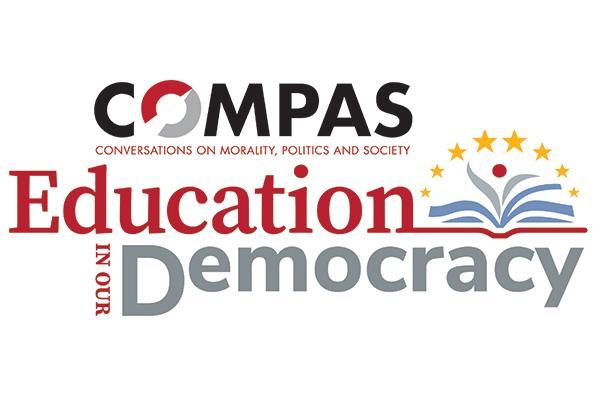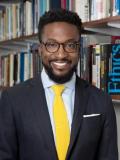
Overview
As many Americans increasingly get their news and views from social media and other online venues, the internet has become an undeniably significant context for civic education and engagement. But how should our democracy respond to the unique challenges and opportunities of developing civic perspectives within this medium? Should individual citizens be expected to properly vet the information that influences their votes? What protections are reasonable when informally learning from one another online? Our panelists will engage these and related matters as we ask Are Trust and Safety Possible When We Learn Online?
Panelists
Nina Jankowicz (Centre for Information Resilience)

Nina Jankowicz is an internationally-recognized expert on disinformation and democratization. Her debut book, How to Lose the Information War (Bloomsbury 2020), was named a New Statesman 2020 book of the year; The New Yorker called it “a persuasive new book on disinformation as a geopolitical strategy.” Her second book, How to Be A Woman Online (Bloomsbury 2022), an examination of online abuse and disinformation and tips for fighting back, was deemed “essential” by Publisher’s Weekly.
Currently the Vice President at the UK-based Centre for Information Resilience, a social enterprise focused on countering disinformation, Jankowicz’s expertise spans the public, private, and academic sectors. She has advised governments, international organizations, and tech companies; testified before the United States Congress, UK Parliament, and European Parliament; and led accessible, actionable research about the effects of disinformation on women, minorities, democratic activists, and freedom of expression around the world.
Jankowicz has extensive media experience, with writing published in many major American newspapers and magazines, including The New York Times, The Washington Post, and The Atlantic. She is a regular guest on major radio and television programs such as the PBS Newshour, CNN’s Fareed Zakaria GPS and Amanpour, the BBC World Service, and NPR’s All Things Considered and Fresh Air.
In 2022, Jankowicz was appointed to lead the Disinformation Governance Board, an intra-agency best practices and coordination entity at the Department of Homeland Security; she resigned the position after a sustained disinformation campaign caused the Biden Administration to abandon the project. Between 2017-2022, Jankowicz held fellowships at the Wilson Center, where she was affiliated with the Kennan Institute and the Science and Technology Innovation Program. In 2016-17, she advised the Ukrainian Foreign Ministry on disinformation and strategic communications under the auspices of a Fulbright-Clinton Public Policy Fellowship. Prior to her Fulbright grant, she managed democracy assistance programs to Russia and Belarus at the National Democratic Institute.
Jankowicz holds a Master’s degree from the Center for Eurasian, Russian, and East European Studies at Georgetown University’s School of Foreign Service. She is a proud alumna of Bryn Mawr College, where she studied Political Science and Russian and graduated magna cum laude. She is fluent in Russian and speaks proficient Ukrainian and Polish. In her spare time, Jankowicz enjoys acting in local musical theater productions and hiking. She lives outside of Washington, DC with her husband, son, dog, and cat.
Nicolas Burbules (University of Illinois, Urbana-Champaign)

Nicholas C. Burbules is the Gutgsell Professor in the Department of Educational Policy, Organization and Leadership at the University of Illinois, Urbana-Champaign. His primary research areas are philosophy of education; teaching through dialogue; and technology and education.
His current philosophical work focuses primarily on the idea of “situated” philosophy of education, a way of reframing the question of whether philosophy of education is merely a derivative branch of pure philosophy or an “applied” field. His current work on technology emphasizes the topic of ubiquitous learning, the study of new models of “anywhere, anytime” teaching and learning arising from the proliferation of mobile technologies and pervasive wireless connectivity.
He has authored or edited sixteen books and two hundred journal articles and book chapters. He is frequently invited to lecture at universities around the world, and a number of his publications have been translated into other languages. He holds an M.A. in philosophy and a Ph.D. in philosophy of education from Stanford University.
He is currently the Education Director for the National Center on Professional and Research Ethics, located at the University of Illinois, Urbana-Champaign.
His most recent books are Showing and Doing: Wittgenstein as a Pedagogical Philosopher, coauthored with Michael Peters and Paul Smeyers (2010, Paradigm Press) and Feminisms and Educational Research, coauthored with Wendy Kohli (2012, Rowman and Littlefield). He co-edited, with Paul Smeyers, David Bridges, and Morwenna Griffiths, the International Handbook of Interpretation in Educational Research (Springer, 2015).
Moderator: Winston Thompson (Educational Studies, OSU)

Winston C. Thompson is an Associate Professor of Philosophy of Education and Associate Professor of Philosophy (by courtesy). He received his PhD (with distinction) in Philosophy and Education from Teachers College, Columbia University. Following this, he has been a faculty member in the Steinhardt School of Culture, Education, and Human Development at New York University and the College of Liberal Arts at the University of New Hampshire. More recently, he was Fellow-in-Residence at the Edmond J. Safra Center for Ethics at Harvard University. Thompson joined The Ohio State University in autumn 2018.
